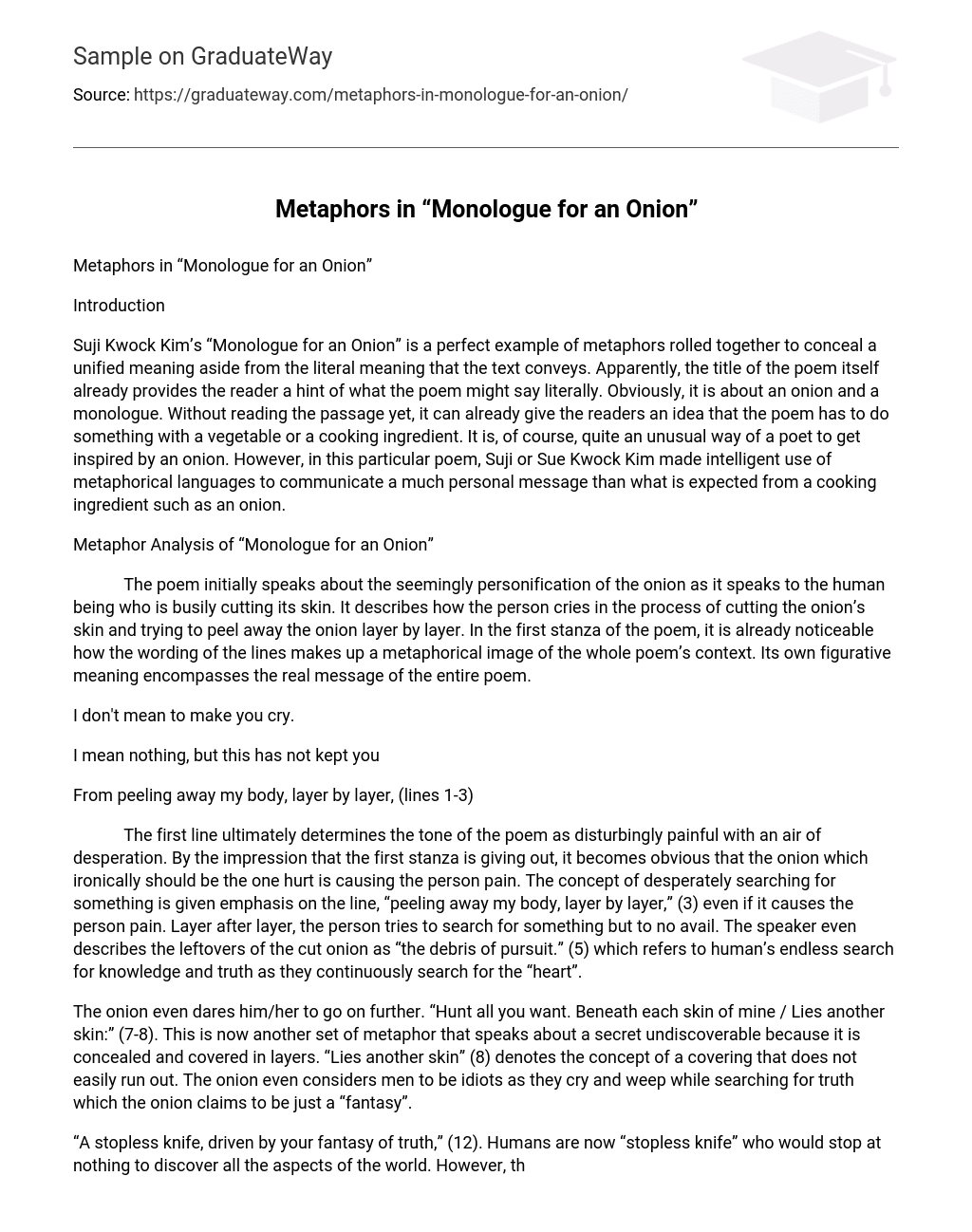Introduction.
Suji Kwock Kim’s Monologue for an Onion” is a perfect example of metaphors rolled together to conceal a unified meaning, aside from the literal meaning that the text conveys. Apparently, the title of the poem itself already provides the reader with a hint of what the poem might say literally. Obviously, it is about an onion and a monologue. Without reading the passage yet, it can already give the readers an idea that the poem has to do with something related to a vegetable or a cooking ingredient. It is, of course, quite an unusual way for a poet to get inspired by an onion. However, in this particular poem, Suji or Sue Kwock Kim made intelligent use of metaphorical language to communicate a much more personal message than what is expected from a cooking ingredient such as an onion.
Metaphor analysis of Monologue for an Onion.”
The poem initially speaks about the seemingly personification of the onion as it speaks to the human being who is busily cutting its skin. It describes how the person cries in the process of cutting the onion’s skin and trying to peel away the onion layer by layer. In the first stanza of the poem, it is already noticeable how the wording of the lines makes up a metaphorical image of the whole poem’s context. Its own figurative meaning encompasses the real message of the entire poem.
I don’t mean to make you cry.
I mean nothing, but this has not kept you.
From peeling away my body, layer by layer,
The first line ultimately determines the tone of the poem as disturbingly painful with an air of desperation. By the impression that the first stanza is giving out, it becomes obvious that the onion, which ironically should be the one hurt, is causing the person pain. The concept of desperately searching for something is given emphasis in the line, “peeling away my body, layer by layer,” (3) even if it causes the person pain. Layer after layer, the person tries to search for something but to no avail. The speaker even describes the leftovers of the cut onion as “the debris of pursuit” (5), which refers to humans’ endless search for knowledge and truth as they continuously search for the “heart.”
The onion even dares him or her to go further. Hunt all you want. Beneath each skin of mine lies another skin:” (7-8). This is yet another metaphor that speaks about a secret that is undiscoverable because it is concealed and covered in layers. “Lies another skin” (8) denotes the concept of a covering that is not easily revealed. The onion even considers men to be idiots as they cry and weep while searching for truth, which the onion claims to be just a “fantasy.”
A stopless knife, driven by your fantasy of truth,” (12). Humans are now a “stopless knife” who will stop at nothing to discover all aspects of the world. However, the onion advises that people must stay content with how truths are covered by the world because that is how it is supposed to be – concealed and protected.
You must not grieve that the world is glimpsed.
Through veils, how else can it be seen?
How will you rip away the veil of the eye (16-18)?
The metaphor in the stanza above is symbolic, as it suggests that everyone must be satisfied with the things that he or she already knows because even our visions are covered with veils” that we cannot “rip away”. It is most likely referring to the naked eye of human beings. The metaphor in this stanza ultimately leads to the realization that not every truth in the world is meant to be revealed, the same way that not all of them are meant to be understood by mere humans.
Your soul is cut moment to moment by a blade / Of fresh desire,” (25-26). This metaphorical line insinuates how the person’s situation is actually similar to that of an onion being ruined by his or her desires to further his or her knowledge. The onion concludes that the person would never find the heart of the truth as it does not have one, but rather it is the other way around: “A heart that will one day beat you to death” (30). Humans have a heart that will ultimately lead them to death when it finally stops “beating.”
Conclusion.
An in-depth analysis of the metaphors included in the poem Monologue for an Onion” would lead to the realization that the brief metaphorical explanation of the poem lies in the metaphorical statement that “We are the onions.” As human beings, we strive for knowledge as we stay alive on this planet. However, if one were to contemplate the real situation, people get hurt in the process. As we learn more, we also change, thus shedding another skin. We get peeled off by the truths that we desperately try to uncover, which can alter our former beliefs. It is then that we feel misery. The metaphors in this poem clearly have a major effect on understanding what the poem is all about. The use of words that are associated with human behavior makes it easier to comprehend as a poem about a person’s desperate quest for truth. The use of the onion as a symbolic image to elaborate the journey of a human being is actually much better to understand because of its dramatic and sensible impact on the readers’ perception.
Works Cited
Kwock Kim, Suji. Monologue for an Onion.” Poets.org. http://www.poets.org/viewmedia.php/prmMID/16473.





